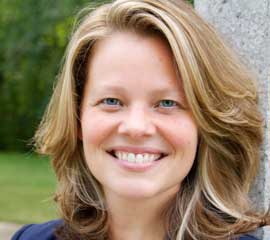E&M’s Vicki Baker Is Taking Her Mid-Career Educators Workshop to Europe
The Albion professor has worked for years to bring the challenges of mid-career educators to the forefront. Now, as a Fulbright Specialist, she will help shape faculty development in The Netherlands.
February 20, 2020
By Chuck Carlson
Economics and Management Professor Vicki Baker is taking her quest to assist, inform and, perhaps, reshape mid-career professors to the international stage.
Baker, who has studied and written extensively about the topic for several years, has been selected as a Fulbright Specialist and will be in The Netherlands February 28-March 13 to support faculty development at University College Utrecht, a liberal arts college housed within Utrecht University’s College of Academic Teaching.
“This is not just a national issue,” Baker says, referring to the United States. “This is now a global issue.”

Dr. Vicki Baker will spend two weeks at University College Utrecht in The Netherlands teaching faculty about the challenges mid-career educators face. She joined Albion College’s Department of Economics and Management in 2007.
And it’s one she has been particularly passionate about since 2016 when, thanks to a grant from the Henry Luce Foundation, she teamed with two other professors nationally to study—and eventually write a book about—the challenges facing mid-career educators at liberal arts colleges.
A second book, Success After Tenure: Supporting Mid-Career Faculty, followed in 2019 and a third will come out later this year, titled Charting Your Path to Full: A Guide for Women Associate Professors.
Along the way, her work caught the attention of U.S. higher education administrators. Now, that interest has extended to Europe. Dr. Christel Lutz, director of faculty development at University College Utrecht (UCU), read Baker’s first book and was intrigued by her views on how faculty development could evolve, particularly in liberal arts colleges.
Eventually, the idea of Baker engaging in faculty development and career coaching as part of the Fulbright program came together, and Utrecht’s specific proposal—coupled with Baker’s expertise on the subject—proved to be an ideal fit.
During her time in Utrecht, Baker will offer examples of successful faculty development in the United States; provide coaching and guidance of faculty members through workshops, peer counseling and “brown bag” sessions; and expand on ways to help UCU assimilate those goals into their faculty expectations and faculty development support system.
“It’s an exciting opportunity,” says Baker, who admits that her research into mid-career faculty, especially women associate professors seeking advancement, has taken off in directions she never imagined.
“You’re hopeful it will be successful, but I didn’t dream it would lead to a second or third book and now this,” she says. “But as I dig into this topic, there are a lot of challenges for mid-career faculty. Many groups have issues, but women are disadvantaged, minority groups are disadvantaged. There’s really nothing out there to help assist professors in mid career.”
For Baker, this is yet another step forward in helping to solve what she, and others, see as a major problem in higher education.
“You plan on doing good work and helping make people’s lives better,” she says.
Baker is also developing and delivering a mid-career faculty workshop at the University of Cincinnati. She hopes to plan another at Purdue University, and has already held workshops at Michigan State University, the College of Wooster, Wabash College and with the Great Lakes Colleges Association.
“And I’ve already got an idea for a fourth book,” she adds.